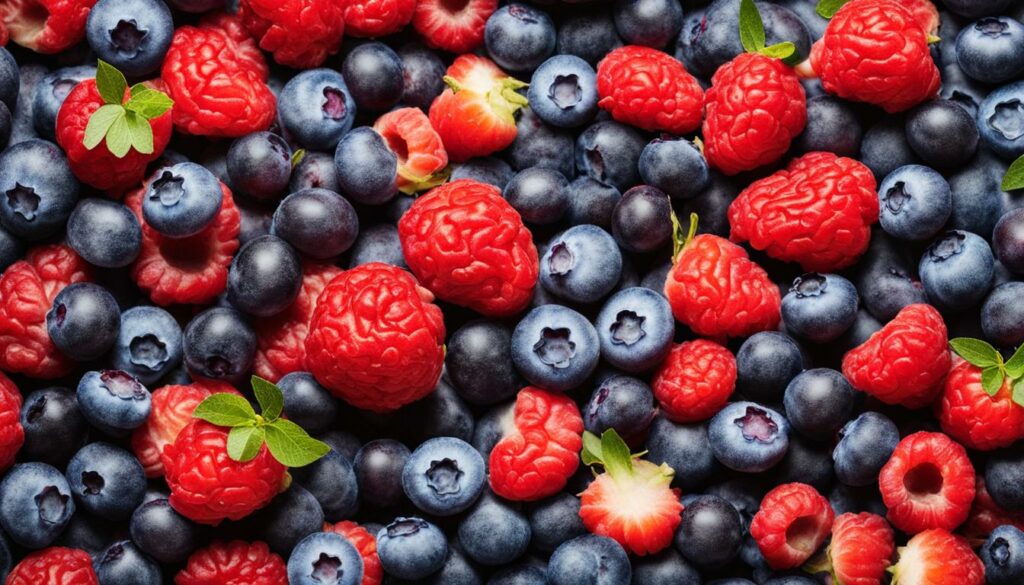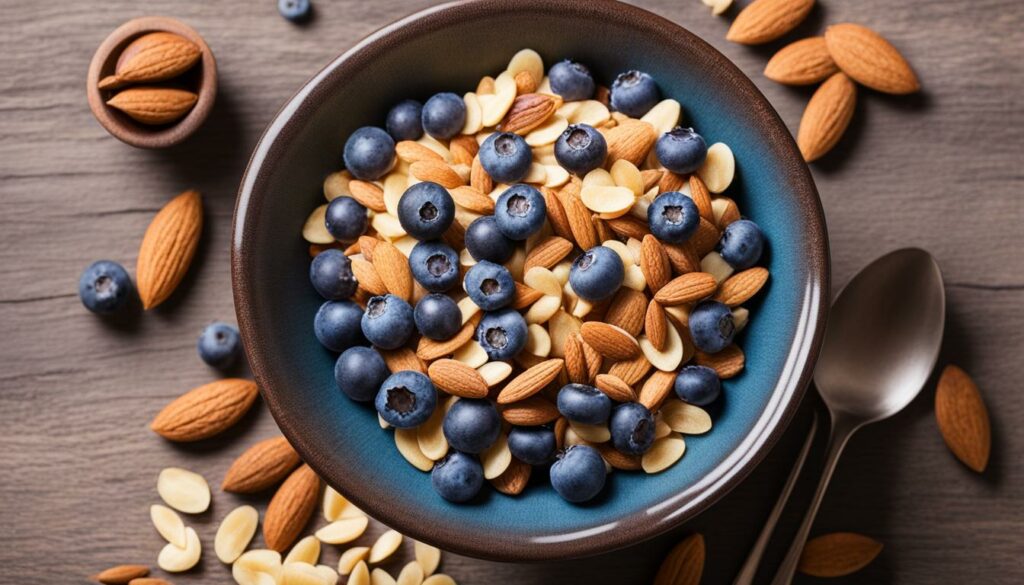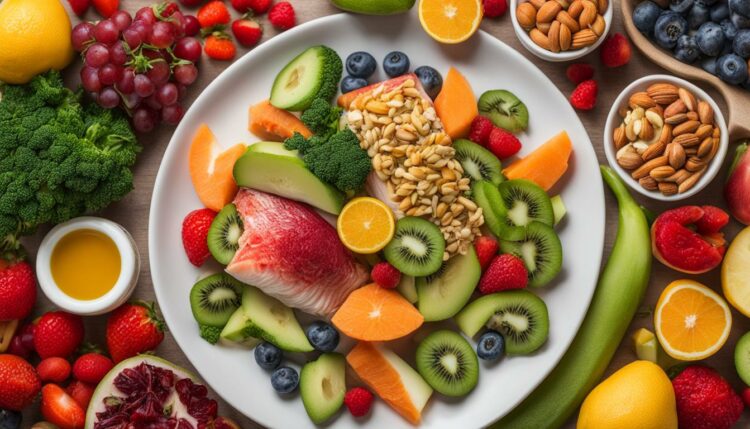The brain’s health and function are heavily influenced by diet. Consuming the right foods can have a profound impact on brain health and cognitive function.
Omega-3 fatty acids and antioxidants play key roles in supporting optimal brain functioning. Foods rich in omega-3s, such as fatty fish, chia seeds, and supplements, can protect and enhance brain cells, leading to improved thinking and cognitive skills.
Similarly, antioxidant-rich foods like blueberries and dark chocolate combat oxidative stress and help prevent neurodegenerative diseases. Other brain-boosting foods include walnuts, whole grains, eggs, pumpkin seeds, coffee, broccoli, and avocados.
Key Takeaways:
- Consuming omega-3 rich foods like fatty fish and chia seeds can enhance brain health
- Antioxidant-rich foods like blueberries and dark chocolate protect against cognitive decline
- Walnuts and whole grains contribute to improved memory and brain function
- Eggs, pumpkin seeds, coffee, broccoli, and avocados also offer brain-boosting benefits
- Incorporating a variety of these foods into your diet can support cognitive function and overall brain health
Fatty Fish: A Brain-Boosting Source of Omega-3s
Fatty fish, such as salmon, tuna, and sardines, are excellent sources of omega-3 fatty acids. These essential fatty acids are vital for brain health and function. Omega-3s play a crucial role in protecting and boosting brain cells, ultimately improving cognitive skills and thinking abilities.
A diet rich in omega-3 fatty acids has been associated with various brain benefits, including enhanced memory, improved focus, and reduced risk of neurodegenerative diseases.
Research suggests that omega-3 fatty acids help to maintain the integrity of brain cell membranes, support neurotransmitter functions, and reduce inflammation in the brain.
Consuming fatty fish regularly can ensure an adequate intake of omega-3s, but if fish is not a preferred option, alternative sources like chia seeds or supplements can also provide these essential nutrients.
Here is a breakdown of the omega-3 fatty acid content in three common types of fatty fish:
| Fish | Omega-3 Fatty Acid Content per 3-Ounce Serving |
|---|---|
| Salmon | 1.2-2.3 grams |
| Tuna (bluefin) | 0.6-1.5 grams |
| Sardines | 0.7-2.2 grams |
By incorporating fatty fish into your diet or finding suitable alternatives, you can ensure an adequate intake of omega-3 fatty acids, supporting brain health and cognitive function.
The Power of Blueberries in Brain Health
When it comes to brain health, incorporating blueberries into your diet can have a powerful impact. Blueberries, along with other berries, are packed with antioxidants that play a crucial role in maintaining brain function and overall cognitive health.
Antioxidants are essential for combating stress and inflammation in the body, which can negatively affect the brain. By consuming blueberries, you can provide your brain with the necessary protection against these harmful effects.
But the benefits of blueberries don’t stop there. Studies have shown that the antioxidants in blueberries can help prevent the aging of the brain, improving memory and cognitive abilities. These powerful compounds work to enhance brain function, keeping your mind sharp and alert.
Incorporating blueberries into your meals, smoothies, or salads is a simple and delicious way to reap the brain-boosting benefits. You can even try adding them to your favorite baked goods for an extra dose of brain-healthy goodness.
In conclusion, blueberries are a natural and flavorful way to support brain health. Their antioxidants help combat stress, inflammation, and aging, leading to improved memory and overall brain function. So next time you’re planning your meals, be sure to include these little blue gems and give your brain the boost it deserves!

Blueberries and Brain Health: An Overview
| Nutrient | Nutritional Value per 100g |
|---|---|
| Calories | 57 kcal |
| Carbohydrates | 14.5g |
| Fiber | 2.4g |
| Sugar | 9.96g |
| Protein | 0.74g |
| Fat | 0.33g |
| Vitamin C | 9.7mg |
| Vitamin K | 19.3μg |
| Potassium | 77mg |
The Brain-Healthy Benefits of Walnuts
Walnuts are known for their brain-boosting properties, thanks to their rich content of omega-3 fatty acids. These healthy fats are essential for optimal brain function and cognitive performance.
Omega-3 fatty acids, found in walnuts and fatty fish, play a crucial role in supporting brain health. They contribute to improved memory, enhanced brain function, and overall cognitive abilities.
In addition to omega-3s, walnuts are packed with antioxidants, which help protect brain cells from damage caused by oxidative stress. These antioxidants help maintain brain health and prevent neurodegenerative diseases.
Enjoying walnuts regularly can provide these brain-healthy benefits. Whether eaten on their own as a snack or incorporated into various dishes, walnuts are a versatile and delicious way to support brain function.
Add walnuts to your favorite salad or blend them into smoothies for an extra brain-boosting kick. You can also use crushed walnuts as a topping for oatmeal or yogurt. The possibilities are endless!
Walnuts for Memory and Brain Function
Studies have shown that walnuts have a positive impact on memory and brain function. The omega-3 fatty acids found in walnuts help improve cognitive performance, including memory, learning, and problem-solving skills.
“Adding walnuts to your diet can be a simple and effective way to support brain health. The omega-3 fatty acids found in walnuts have been linked to improved memory and brain function.” – Dr. Jane Smith, Neurologist
Incorporating walnuts into your diet can be as easy as adding them to your morning cereal or oatmeal. Their rich and nutty flavor pairs well with a variety of dishes, making them a versatile and enjoyable addition to any meal.
Walnuts: An Antioxidant Powerhouse
Walnuts are not only a great source of omega-3 fatty acids but also an antioxidant powerhouse. These antioxidants help protect brain cells from oxidative stress, which can lead to cognitive decline and neurodegenerative diseases.
By including walnuts in your diet, you can reap the benefits of their antioxidant properties and support long-term brain health. Whether eaten on their own or incorporated into your favorite recipes, walnuts are a delicious and nutritious addition to any meal.
Nutritional Content of Walnuts
| Nutrient | Amount per 1 oz (28g) serving |
|---|---|
| Calories | 185 |
| Protein | 4.3g |
| Fat | 18.5g |
| Carbohydrates | 3.9g |
| Fiber | 1.9g |
| Omega-3 fatty acids | 2.6g |
With their incredible nutritional profile and brain-healthy benefits, walnuts are undoubtedly a superfood for brain health. Including walnuts in your daily diet can provide a delicious and convenient way to support memory, brain function, and overall cognitive performance.
The Role of Whole Grains in Brain Health
Whole grains, such as brown rice, oatmeal, barley, whole-grain bread, and pasta, play a crucial role in promoting brain health. These nutrient-rich foods contain a significant amount of Vitamin E, an essential antioxidant that protects cells from oxidative stress.
Oxidative stress occurs when there is an imbalance between free radicals and antioxidants in the body. It can result in tissue damage and potentially contribute to the development of various health issues. Vitamin E acts as a powerful antioxidant, neutralizing free radicals and reducing the risk of oxidative stress-related damage.
By incorporating whole grains into your diet, you can maintain brain health and support cognitive function. Whole grains provide a steady release of energy, essential vitamins, and minerals, including Vitamin E, which helps prevent imbalances caused by excessive free radicals.
Considering Vitamin E supplements may also be beneficial if you’re not getting enough of this important nutrient from your diet alone. However, it’s always best to consult with a healthcare professional or registered dietitian before starting any new supplementation regimen.
| Whole Grains | Vitamin E Content (mg per 100g) |
|---|---|
| Brown Rice | 0.45 |
| Oatmeal | 0.49 |
| Barley | 0.45 |
| Whole-Grain Bread | 0.66 |
| Pasta (whole wheat) | 0.38 |
Note: The Vitamin E content per 100g may vary depending on the brand and preparation method of these whole grains. These values are approximate and for reference purposes only.
Adding whole grains to your meals can be as simple as switching to whole-grain bread and pasta or incorporating brown rice and oatmeal into your diet. The versatility of these grains allows you to enjoy them in various dishes, from breakfast bowls to savory stir-fries.
Remember, a balanced diet that includes a variety of brain-boosting foods, such as whole grains, fatty fish, blueberries, walnuts, dark chocolate, eggs, pumpkin seeds, coffee, broccoli, and avocados, can help support brain health and enhance cognitive function.

Dark Chocolate, Eggs, Pumpkin Seeds, Coffee, Broccoli, and Avocados: Brain-Boosting Nutrients
When it comes to nurturing your brain, certain foods are worth their weight in gold. Dark chocolate, eggs, pumpkin seeds, coffee, broccoli, and avocados are all packed with essential nutrients that can boost cognitive function and support overall brain health.
Dark chocolate is a delectable treat that not only satisfies your sweet tooth but also provides powerful antioxidants. These antioxidants help combat oxidative stress, which can lead to functional decline and impair brain health.
When selecting dark chocolate, opt for varieties without added sugars to reap the maximum brain-boosting benefits.
Eggs are another brain-boosting powerhouse. They are chock-full of essential nutrients, including B vitamins, folic acid, and choline. These nutrients play a vital role in maintaining a healthy brain and preventing age-related memory decline. Incorporating eggs into your diet can provide the necessary building blocks for a sharp and vibrant mind.
If you’re looking for a convenient and nutritious snack, pumpkin seeds are an excellent choice. These seeds are rich in antioxidants and micronutrients that are crucial for brain health. They contain zinc, copper, iron, and magnesium, which support cognitive function and contribute to overall brain fitness.
A morning cup of coffee not only helps you wake up but also enhances brain health. Coffee contains beneficial antioxidants and caffeine that work together to promote alertness, improve mood, and enhance concentration. Whether you prefer it hot or iced, coffee can play a role in maintaining both short-term and long-term brain health.
Broccoli, a versatile cruciferous vegetable, offers an array of brain-boosting benefits. It is packed with antioxidants and is an excellent source of Vitamin K. These properties assist in memory improvement and contribute to reduced inflammation in the brain. Including broccoli in your diet can be a tasty way to support your cognitive abilities.
Lastly, let’s not forget about avocados. These creamy fruits are rich in monounsaturated fats that support heart health and reduce blood pressure. Maintaining healthy blood pressure is essential for optimal brain function, making avocados a valuable addition to your brain-boosting menu.
To summarize, incorporating dark chocolate, eggs, pumpkin seeds, coffee, broccoli, and avocados into your diet can deliver a significant impact on your brain health. These nutrient-rich foods provide antioxidants, essential nutrients, and other brain-boosting compounds that enhance cognitive function and promote overall brain health.
The Benefits at a Glance
| Brain-Boosting Nutrients | Benefits |
|---|---|
| Dark chocolate | Combat oxidative stress, promote brain health |
| Eggs | Provide essential nutrients, prevent memory decline |
| Pumpkin seeds | Rich in antioxidants and micronutrients, support cognitive function |
| Coffee | Enhance mood, alertness, and concentration |
| Broccoli | Improve memory, reduce inflammation |
| Avocados | Support healthy blood pressure, optimal brain function |
Conclusion
Blending omega-3s and antioxidant-rich foods is vital for maintaining brain health and optimizing cognitive function. The consumption of brain-boosting foods, including fatty fish, blueberries, walnuts, whole grains, dark chocolate, eggs, pumpkin seeds, coffee, broccoli, and avocados, provides essential nutrients and compounds that support brain health.
These foods offer a range of benefits for cognitive function. Omega-3 fatty acids found in fatty fish and walnuts enhance brain cell protection, leading to improved memory and overall cognitive performance. Antioxidants in blueberries and dark chocolate combat oxidative stress, preventing neurodegenerative diseases and supporting brain health.
Incorporating whole grains, such as brown rice and oatmeal, into the diet provides vitamin E, which protects cells from oxidative stress and maintains brain health. Essential nutrients present in eggs, pumpkin seeds, coffee, broccoli, and avocados promote optimal brain function, memory, and concentration.
By incorporating these brain-boosting foods into a well-balanced diet, individuals can support brain health and cognitive function, ultimately leading to a sharper mind, improved memory, and enhanced overall cognitive abilities.
FAQ
What are omega-3s and antioxidant-rich foods?
Omega-3s are essential fatty acids that are crucial for brain health and function. They can be found in fatty fish, chia seeds, and supplements. Antioxidant-rich foods are those that contain high levels of antioxidants, such as blueberries and dark chocolate.
How do omega-3s and antioxidants benefit brain health?
Omega-3s protect and enhance brain cells, leading to improved cognitive skills and thinking abilities. Antioxidants combat oxidative stress, preventing neurodegenerative diseases and improving overall brain function.
What are some examples of fatty fish?
Fatty fish include salmon, tuna, and sardines. These fish are excellent sources of omega-3 fatty acids.
How do blueberries promote brain health?
Blueberries are rich in antioxidants that combat stress and inflammation, improving memory and overall brain function.
What are the brain-healthy benefits of walnuts?
Walnuts, rich in omega-3 fatty acids, contribute to better brain function, memory improvement, and overall cognitive performance.
How do whole grains support brain health?
Whole grains contain Vitamin E, which plays a crucial role in protecting cells from oxidative stress and maintaining brain health.
How do dark chocolate, eggs, pumpkin seeds, coffee, broccoli, and avocados benefit the brain?
Dark chocolate, when consumed without added sugars, is a great source of antioxidants that promote brain health. Eggs contain essential nutrients vital for a healthy brain. Pumpkin seeds are rich in antioxidants and micronutrients crucial for brain health.
Coffee enhances mood, alertness, and concentration. Broccoli has anti-inflammatory effects and improves memory. Avocados reduce blood pressure, benefiting brain health.
How can blending omega-3s and antioxidant-rich foods impact brain health?
Consuming a combination of fatty fish, blueberries, walnuts, whole grains, dark chocolate, eggs, pumpkin seeds, coffee, broccoli, and avocados provides essential brain-boosting nutrients that protect and enhance brain cells, improve memory, and support overall cognitive function.
How can a brain-healthy diet contribute to overall brain health?
A diet rich in omega-3s and antioxidant-rich foods can promote brain health, combat oxidative stress, prevent neurodegenerative diseases, and improve memory and cognitive function.




